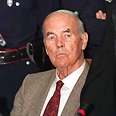
Report: Nazi war criminal Erich Priebke to be buried in Italy
Erich Priebke to be buried in secret Italy location, his lawyer says, following long legal dispute after Nazi officer's death in Rome last week
Nazi war criminal Erich Priebke will be buried in a secret location in Italy, his lawyer said on Saturday, following a long legal dispute after the former SS officer's death in Rome last week.
"We have an agreement with the authorities over the burial of Erich Priebke in a secret location," Paolo Giachini said, after a funeral rite for Priebke earlier sparked street clashes near the Italian capital.
Related stories:
Asked by AFP whether the burial would take place in Italy, Giachini answered "yes." Italian news agency ANSA later reported him saying the location would be "either in Italy or in Germany".
"The agreement satisfies the family and ethical and spiritual requirements," Giachini said, adding that there would be "a small ceremony for relatives" following the burial rite.
The German embassy in Rome said it had not been contacted by Priebke's lawyer and had no request for a burial, ANSA quoted embassy sources saying.
There is concern among Italian officials that if any burial plot becomes public it could become a pilgrimage point for Nazi sympathisers.
The 100-year-old died while living under house arrest for his role in the massacre of 335 people – almost all of them civilians – in the Ardeatine complex of caves near Rome in 1944.
Priebke was unrepentant to the end and in a chilling "video testament" released posthumously by Giachini this week said the massacre was actually the fault of partisan fighters because it was retaliation against the killing of 33 Germans.
Priebke also said the mass killing was "terrible" for him and the other SS officers involved.
The controversy over his long life as a free man and the lax conditions of his house arrest and the subsequent funeral arrangements has shown how raw the wounds of that massacre still are in the city.
Rome city authorities have banned any burial and the Vatican earlier issued an unprecedented order barring any Catholic church in the city from holding a funeral mass for the war criminal.
Giachini tried to hold a funeral on Tuesday at a seminary of the ultra-conservative Catholic splinter group Society of St Pius X in the town of Albano Laziale outside Rome, but the rite was shut down by a police order amid protests and clashes.
The hearse drove into the compound through a crowd of hundreds of local residents and leftist protesters, who spat and punched the car.
The police later interrupted the funeral proceedings when sympathisers broke in and attempted to stage a neo-Nazi rally.
Argentina, where he had wanted to be buried, said it would not take the body and Germany said it was up to the family to decide on funeral arrangements.
Relatives of his victims and Jewish groups including the Nazi-hunting Simon Wiesenthal Center said the body should be cremated – as has been the case for most of the top Nazi war criminals.
The dispute marred a major Holocaust memorial ceremony on Wednesday in Rome that commemorated the decimation of the Italian capital's historic Jewish community by the Nazis in 1943.
Some commentators have accused Giachini, a lawyer with close links to the far-right, of using the controversy to create publicity for himself.
Others said the row was useful as testimony to the gravity of the crimes committed by the Nazis.
"Thank you Priebke for reminding us of the horror," Italy's best-selling daily, Corriere della Sera, said in an editorial.
Priebke's case first came to light when a news crew from US television network ABC tracked him down in Bariloche in Argentina, where he had lived untroubled for nearly 50 years as an upstanding member of the German exile community.
He was initially placed under house arrest in Argentina, then extradited to Italy where his trial attracted huge media interest.
The trial heard testimony from witnesses who spied on the executions as children and saw Priebke shoot some of the victims in the back of the neck.
Priebke gained an entourage of aficionados in a country where pro-fascist sympathies have never been far from the surface and which saw a wave of militant violence by far-right and far-left groups during the 1970s and 1980s.
- Receive Ynetnews updates directly to your desktop










